Liability of Jak's Parents for Repaying Loan
VerifiedAdded on 2023/04/08
|8
|2123
|450
AI Summary
This document discusses the issue of whether Jak's parents are liable to repay a $43,000 loan to the bank. It explores the rules of unconscionable conduct and misrepresentation and their application in this case. The document advises Jak's parents to rely on the doctrine of unconscionable conduct to eliminate their liability and set aside the terms of the agreement. It also discusses the potential arguments that can be made by Jak and the advised course of action for Jak's parents.
Contribute Materials
Your contribution can guide someone’s learning journey. Share your
documents today.
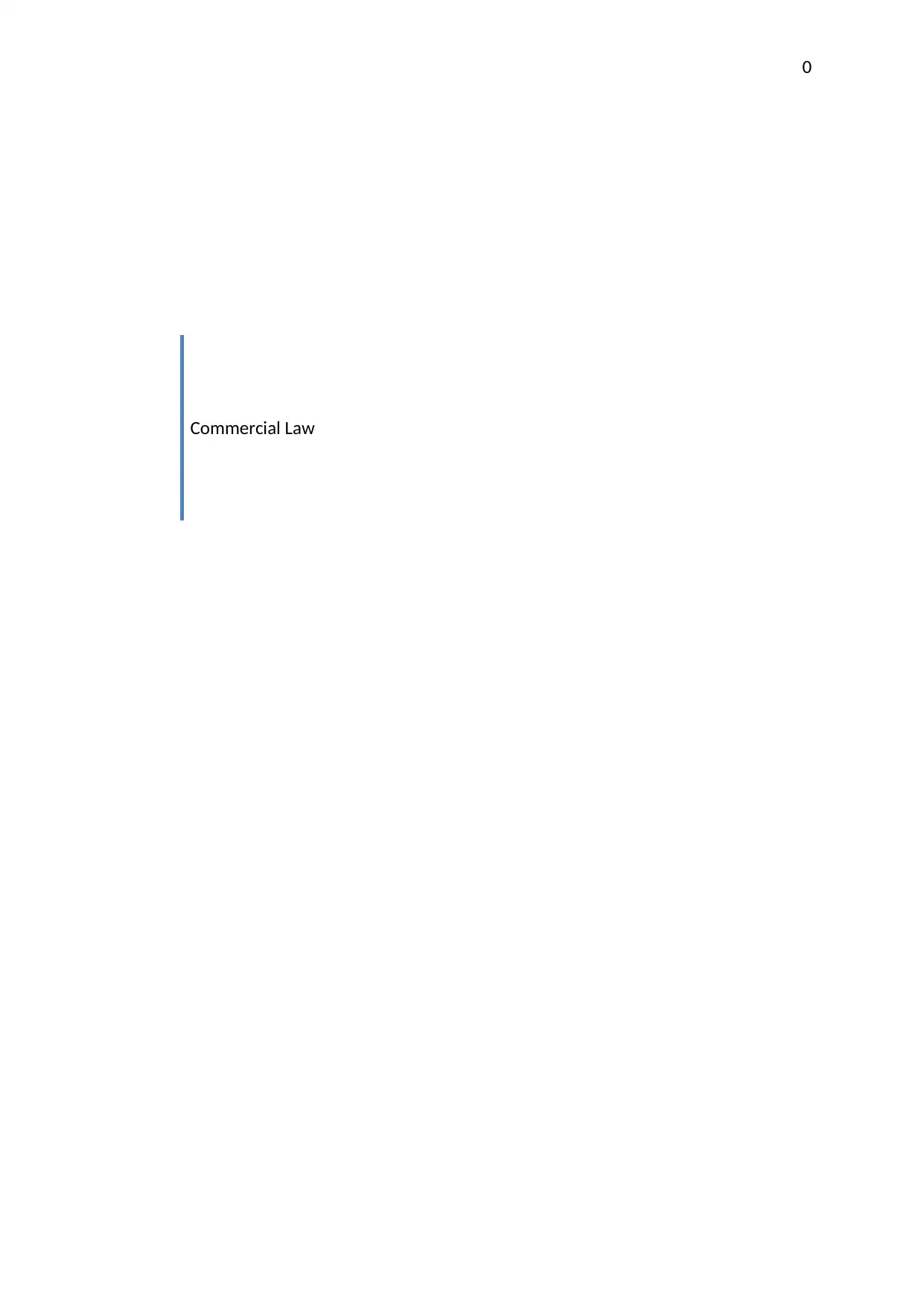
0
Commercial Law
Commercial Law
Secure Best Marks with AI Grader
Need help grading? Try our AI Grader for instant feedback on your assignments.
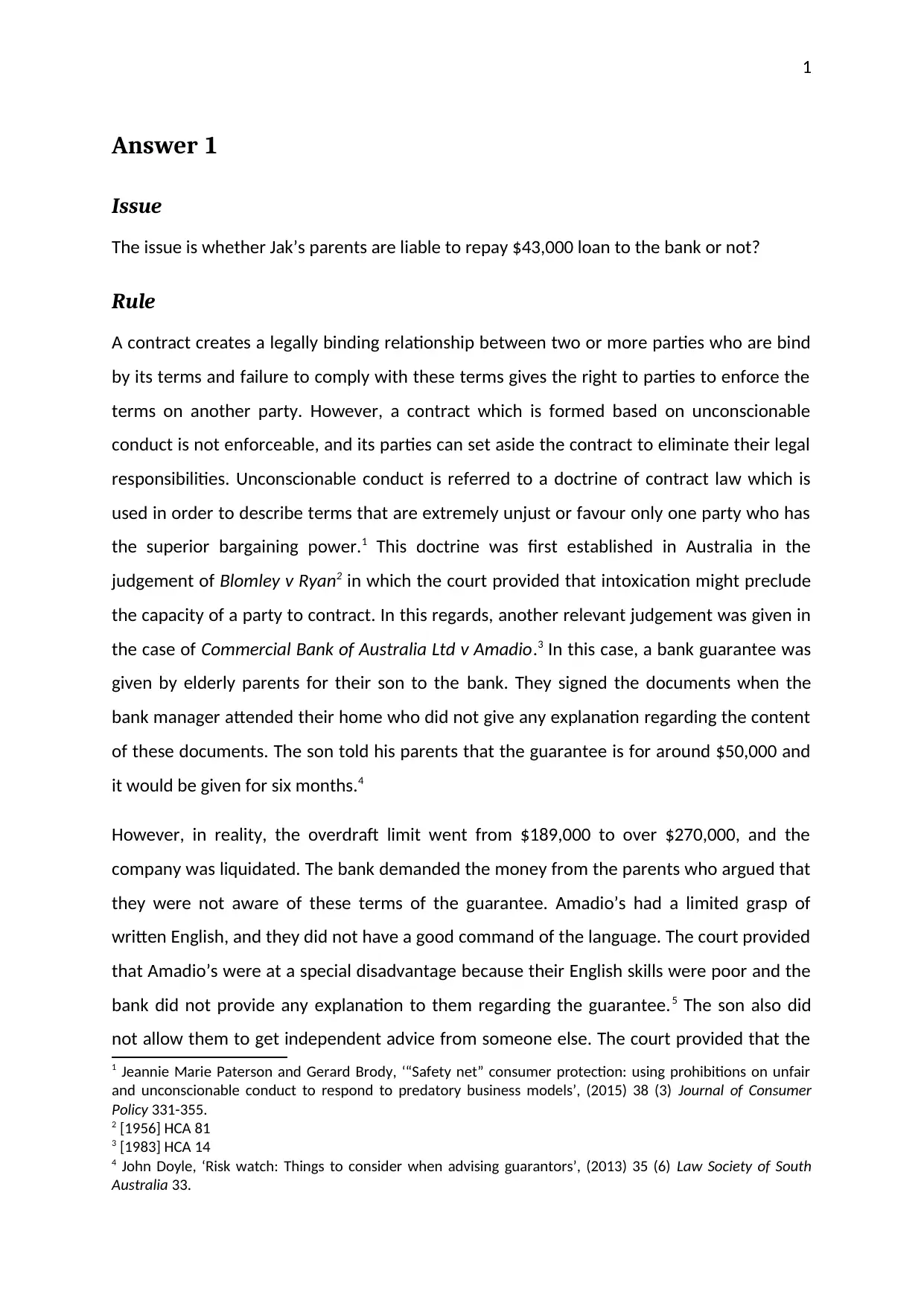
1
Answer 1
Issue
The issue is whether Jak’s parents are liable to repay $43,000 loan to the bank or not?
Rule
A contract creates a legally binding relationship between two or more parties who are bind
by its terms and failure to comply with these terms gives the right to parties to enforce the
terms on another party. However, a contract which is formed based on unconscionable
conduct is not enforceable, and its parties can set aside the contract to eliminate their legal
responsibilities. Unconscionable conduct is referred to a doctrine of contract law which is
used in order to describe terms that are extremely unjust or favour only one party who has
the superior bargaining power.1 This doctrine was first established in Australia in the
judgement of Blomley v Ryan2 in which the court provided that intoxication might preclude
the capacity of a party to contract. In this regards, another relevant judgement was given in
the case of Commercial Bank of Australia Ltd v Amadio.3 In this case, a bank guarantee was
given by elderly parents for their son to the bank. They signed the documents when the
bank manager attended their home who did not give any explanation regarding the content
of these documents. The son told his parents that the guarantee is for around $50,000 and
it would be given for six months.4
However, in reality, the overdraft limit went from $189,000 to over $270,000, and the
company was liquidated. The bank demanded the money from the parents who argued that
they were not aware of these terms of the guarantee. Amadio’s had a limited grasp of
written English, and they did not have a good command of the language. The court provided
that Amadio’s were at a special disadvantage because their English skills were poor and the
bank did not provide any explanation to them regarding the guarantee.5 The son also did
not allow them to get independent advice from someone else. The court provided that the
1 Jeannie Marie Paterson and Gerard Brody, ‘“Safety net” consumer protection: using prohibitions on unfair
and unconscionable conduct to respond to predatory business models’, (2015) 38 (3) Journal of Consumer
Policy 331-355.
2 [1956] HCA 81
3 [1983] HCA 14
4 John Doyle, ‘Risk watch: Things to consider when advising guarantors’, (2013) 35 (6) Law Society of South
Australia 33.
Answer 1
Issue
The issue is whether Jak’s parents are liable to repay $43,000 loan to the bank or not?
Rule
A contract creates a legally binding relationship between two or more parties who are bind
by its terms and failure to comply with these terms gives the right to parties to enforce the
terms on another party. However, a contract which is formed based on unconscionable
conduct is not enforceable, and its parties can set aside the contract to eliminate their legal
responsibilities. Unconscionable conduct is referred to a doctrine of contract law which is
used in order to describe terms that are extremely unjust or favour only one party who has
the superior bargaining power.1 This doctrine was first established in Australia in the
judgement of Blomley v Ryan2 in which the court provided that intoxication might preclude
the capacity of a party to contract. In this regards, another relevant judgement was given in
the case of Commercial Bank of Australia Ltd v Amadio.3 In this case, a bank guarantee was
given by elderly parents for their son to the bank. They signed the documents when the
bank manager attended their home who did not give any explanation regarding the content
of these documents. The son told his parents that the guarantee is for around $50,000 and
it would be given for six months.4
However, in reality, the overdraft limit went from $189,000 to over $270,000, and the
company was liquidated. The bank demanded the money from the parents who argued that
they were not aware of these terms of the guarantee. Amadio’s had a limited grasp of
written English, and they did not have a good command of the language. The court provided
that Amadio’s were at a special disadvantage because their English skills were poor and the
bank did not provide any explanation to them regarding the guarantee.5 The son also did
not allow them to get independent advice from someone else. The court provided that the
1 Jeannie Marie Paterson and Gerard Brody, ‘“Safety net” consumer protection: using prohibitions on unfair
and unconscionable conduct to respond to predatory business models’, (2015) 38 (3) Journal of Consumer
Policy 331-355.
2 [1956] HCA 81
3 [1983] HCA 14
4 John Doyle, ‘Risk watch: Things to consider when advising guarantors’, (2013) 35 (6) Law Society of South
Australia 33.
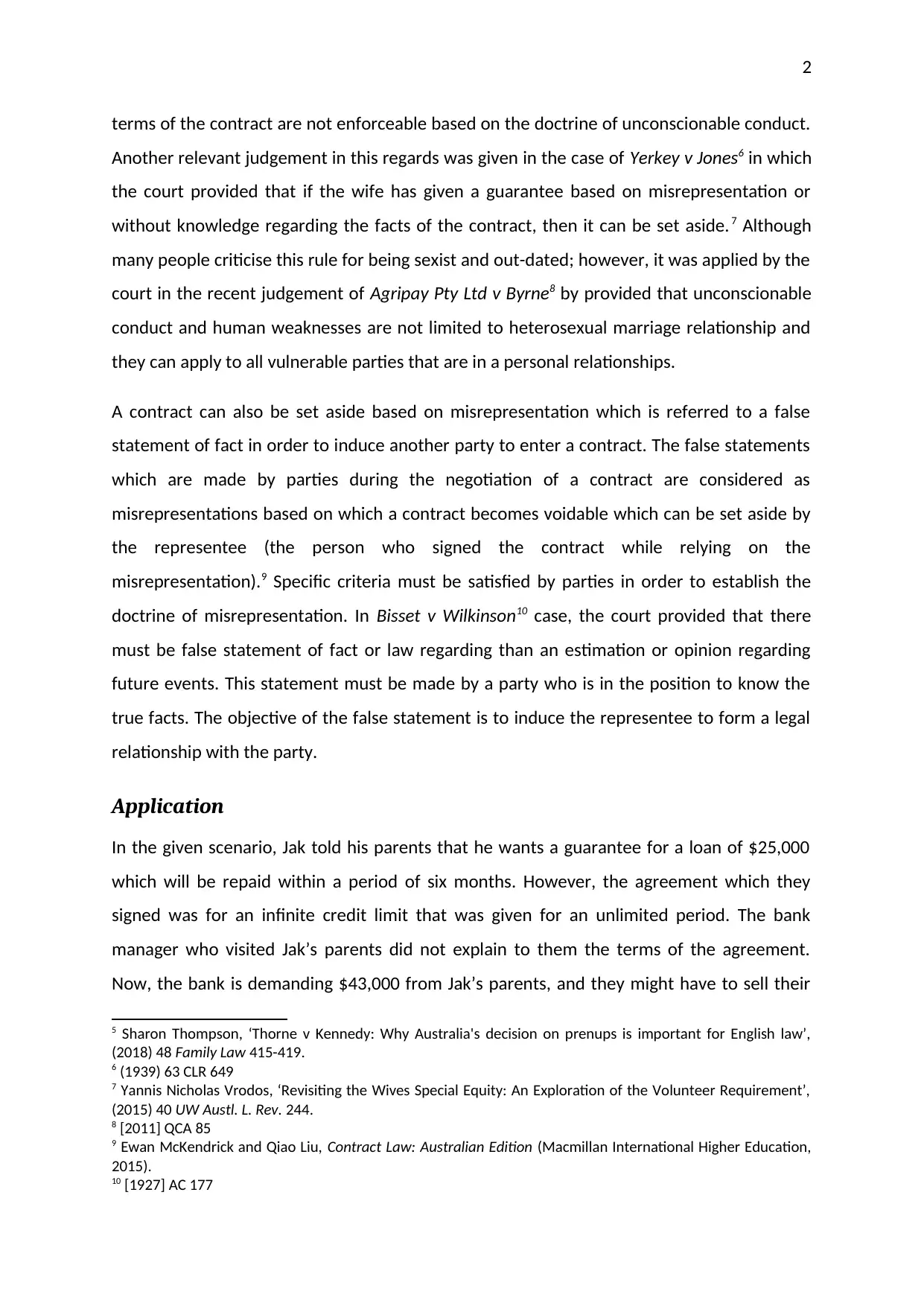
2
terms of the contract are not enforceable based on the doctrine of unconscionable conduct.
Another relevant judgement in this regards was given in the case of Yerkey v Jones6 in which
the court provided that if the wife has given a guarantee based on misrepresentation or
without knowledge regarding the facts of the contract, then it can be set aside. 7 Although
many people criticise this rule for being sexist and out-dated; however, it was applied by the
court in the recent judgement of Agripay Pty Ltd v Byrne8 by provided that unconscionable
conduct and human weaknesses are not limited to heterosexual marriage relationship and
they can apply to all vulnerable parties that are in a personal relationships.
A contract can also be set aside based on misrepresentation which is referred to a false
statement of fact in order to induce another party to enter a contract. The false statements
which are made by parties during the negotiation of a contract are considered as
misrepresentations based on which a contract becomes voidable which can be set aside by
the representee (the person who signed the contract while relying on the
misrepresentation).9 Specific criteria must be satisfied by parties in order to establish the
doctrine of misrepresentation. In Bisset v Wilkinson10 case, the court provided that there
must be false statement of fact or law regarding than an estimation or opinion regarding
future events. This statement must be made by a party who is in the position to know the
true facts. The objective of the false statement is to induce the representee to form a legal
relationship with the party.
Application
In the given scenario, Jak told his parents that he wants a guarantee for a loan of $25,000
which will be repaid within a period of six months. However, the agreement which they
signed was for an infinite credit limit that was given for an unlimited period. The bank
manager who visited Jak’s parents did not explain to them the terms of the agreement.
Now, the bank is demanding $43,000 from Jak’s parents, and they might have to sell their
5 Sharon Thompson, ‘Thorne v Kennedy: Why Australia's decision on prenups is important for English law’,
(2018) 48 Family Law 415-419.
6 (1939) 63 CLR 649
7 Yannis Nicholas Vrodos, ‘Revisiting the Wives Special Equity: An Exploration of the Volunteer Requirement’,
(2015) 40 UW Austl. L. Rev. 244.
8 [2011] QCA 85
9 Ewan McKendrick and Qiao Liu, Contract Law: Australian Edition (Macmillan International Higher Education,
2015).
10 [1927] AC 177
terms of the contract are not enforceable based on the doctrine of unconscionable conduct.
Another relevant judgement in this regards was given in the case of Yerkey v Jones6 in which
the court provided that if the wife has given a guarantee based on misrepresentation or
without knowledge regarding the facts of the contract, then it can be set aside. 7 Although
many people criticise this rule for being sexist and out-dated; however, it was applied by the
court in the recent judgement of Agripay Pty Ltd v Byrne8 by provided that unconscionable
conduct and human weaknesses are not limited to heterosexual marriage relationship and
they can apply to all vulnerable parties that are in a personal relationships.
A contract can also be set aside based on misrepresentation which is referred to a false
statement of fact in order to induce another party to enter a contract. The false statements
which are made by parties during the negotiation of a contract are considered as
misrepresentations based on which a contract becomes voidable which can be set aside by
the representee (the person who signed the contract while relying on the
misrepresentation).9 Specific criteria must be satisfied by parties in order to establish the
doctrine of misrepresentation. In Bisset v Wilkinson10 case, the court provided that there
must be false statement of fact or law regarding than an estimation or opinion regarding
future events. This statement must be made by a party who is in the position to know the
true facts. The objective of the false statement is to induce the representee to form a legal
relationship with the party.
Application
In the given scenario, Jak told his parents that he wants a guarantee for a loan of $25,000
which will be repaid within a period of six months. However, the agreement which they
signed was for an infinite credit limit that was given for an unlimited period. The bank
manager who visited Jak’s parents did not explain to them the terms of the agreement.
Now, the bank is demanding $43,000 from Jak’s parents, and they might have to sell their
5 Sharon Thompson, ‘Thorne v Kennedy: Why Australia's decision on prenups is important for English law’,
(2018) 48 Family Law 415-419.
6 (1939) 63 CLR 649
7 Yannis Nicholas Vrodos, ‘Revisiting the Wives Special Equity: An Exploration of the Volunteer Requirement’,
(2015) 40 UW Austl. L. Rev. 244.
8 [2011] QCA 85
9 Ewan McKendrick and Qiao Liu, Contract Law: Australian Edition (Macmillan International Higher Education,
2015).
10 [1927] AC 177
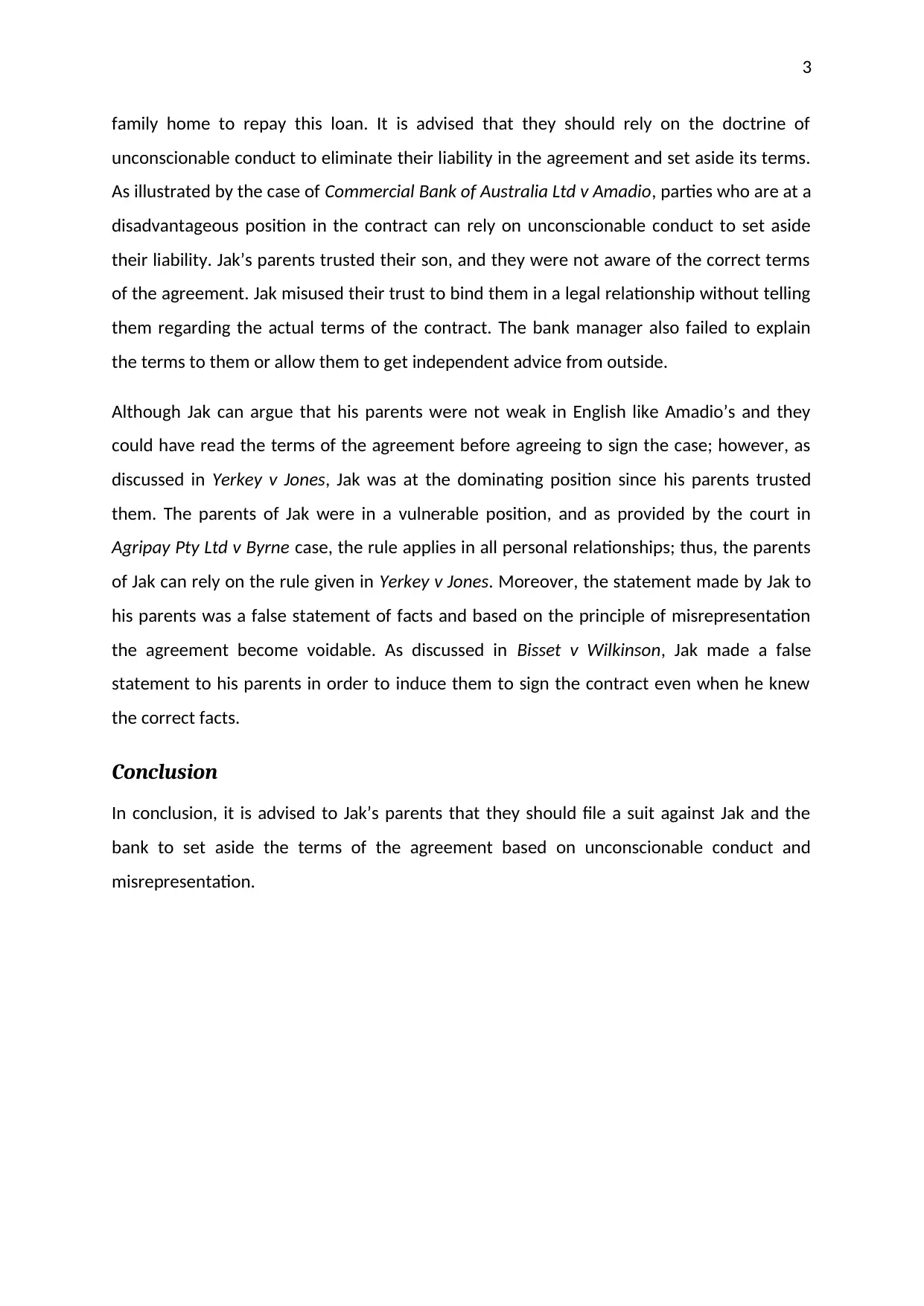
3
family home to repay this loan. It is advised that they should rely on the doctrine of
unconscionable conduct to eliminate their liability in the agreement and set aside its terms.
As illustrated by the case of Commercial Bank of Australia Ltd v Amadio, parties who are at a
disadvantageous position in the contract can rely on unconscionable conduct to set aside
their liability. Jak’s parents trusted their son, and they were not aware of the correct terms
of the agreement. Jak misused their trust to bind them in a legal relationship without telling
them regarding the actual terms of the contract. The bank manager also failed to explain
the terms to them or allow them to get independent advice from outside.
Although Jak can argue that his parents were not weak in English like Amadio’s and they
could have read the terms of the agreement before agreeing to sign the case; however, as
discussed in Yerkey v Jones, Jak was at the dominating position since his parents trusted
them. The parents of Jak were in a vulnerable position, and as provided by the court in
Agripay Pty Ltd v Byrne case, the rule applies in all personal relationships; thus, the parents
of Jak can rely on the rule given in Yerkey v Jones. Moreover, the statement made by Jak to
his parents was a false statement of facts and based on the principle of misrepresentation
the agreement become voidable. As discussed in Bisset v Wilkinson, Jak made a false
statement to his parents in order to induce them to sign the contract even when he knew
the correct facts.
Conclusion
In conclusion, it is advised to Jak’s parents that they should file a suit against Jak and the
bank to set aside the terms of the agreement based on unconscionable conduct and
misrepresentation.
family home to repay this loan. It is advised that they should rely on the doctrine of
unconscionable conduct to eliminate their liability in the agreement and set aside its terms.
As illustrated by the case of Commercial Bank of Australia Ltd v Amadio, parties who are at a
disadvantageous position in the contract can rely on unconscionable conduct to set aside
their liability. Jak’s parents trusted their son, and they were not aware of the correct terms
of the agreement. Jak misused their trust to bind them in a legal relationship without telling
them regarding the actual terms of the contract. The bank manager also failed to explain
the terms to them or allow them to get independent advice from outside.
Although Jak can argue that his parents were not weak in English like Amadio’s and they
could have read the terms of the agreement before agreeing to sign the case; however, as
discussed in Yerkey v Jones, Jak was at the dominating position since his parents trusted
them. The parents of Jak were in a vulnerable position, and as provided by the court in
Agripay Pty Ltd v Byrne case, the rule applies in all personal relationships; thus, the parents
of Jak can rely on the rule given in Yerkey v Jones. Moreover, the statement made by Jak to
his parents was a false statement of facts and based on the principle of misrepresentation
the agreement become voidable. As discussed in Bisset v Wilkinson, Jak made a false
statement to his parents in order to induce them to sign the contract even when he knew
the correct facts.
Conclusion
In conclusion, it is advised to Jak’s parents that they should file a suit against Jak and the
bank to set aside the terms of the agreement based on unconscionable conduct and
misrepresentation.
Secure Best Marks with AI Grader
Need help grading? Try our AI Grader for instant feedback on your assignments.
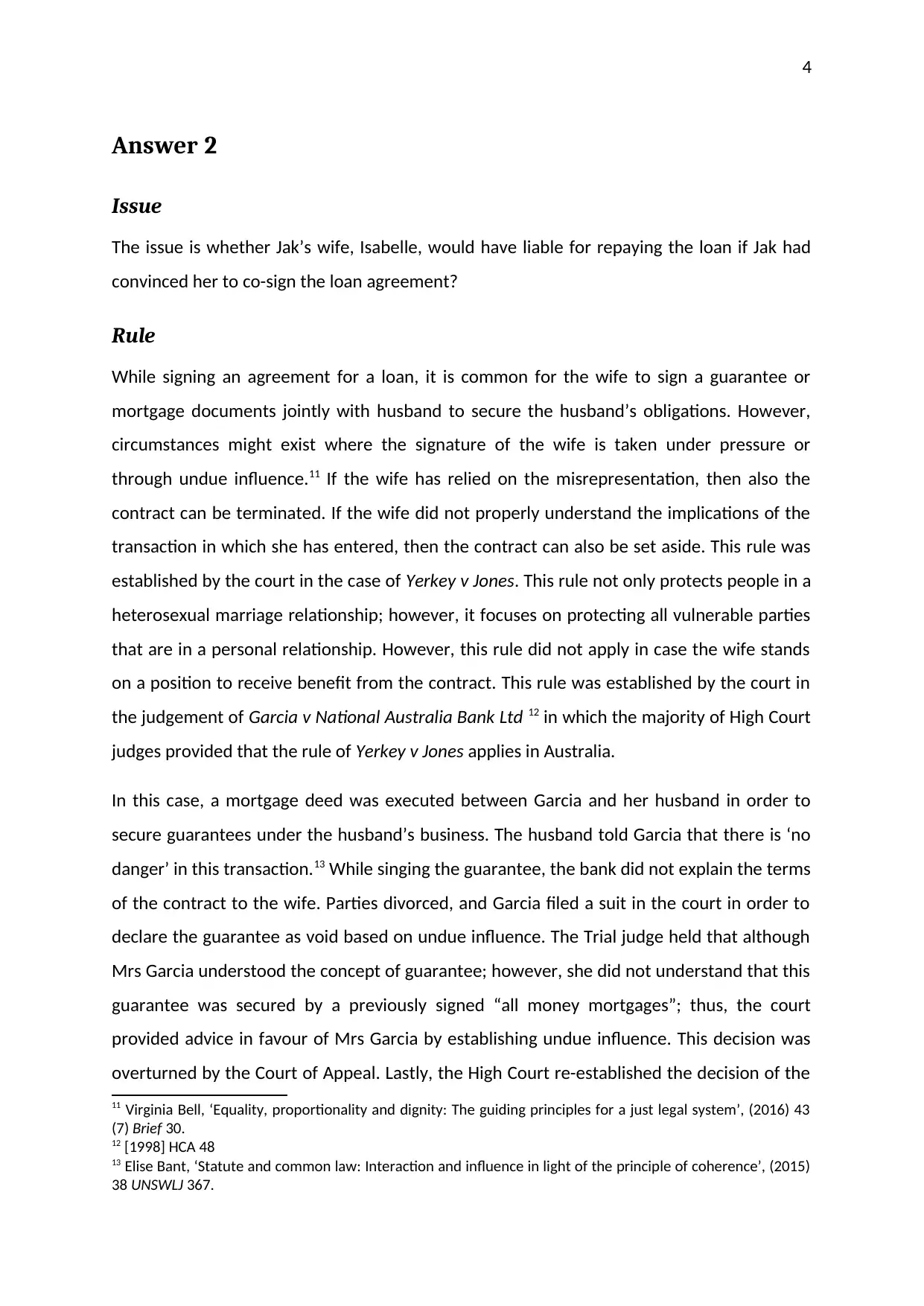
4
Answer 2
Issue
The issue is whether Jak’s wife, Isabelle, would have liable for repaying the loan if Jak had
convinced her to co-sign the loan agreement?
Rule
While signing an agreement for a loan, it is common for the wife to sign a guarantee or
mortgage documents jointly with husband to secure the husband’s obligations. However,
circumstances might exist where the signature of the wife is taken under pressure or
through undue influence.11 If the wife has relied on the misrepresentation, then also the
contract can be terminated. If the wife did not properly understand the implications of the
transaction in which she has entered, then the contract can also be set aside. This rule was
established by the court in the case of Yerkey v Jones. This rule not only protects people in a
heterosexual marriage relationship; however, it focuses on protecting all vulnerable parties
that are in a personal relationship. However, this rule did not apply in case the wife stands
on a position to receive benefit from the contract. This rule was established by the court in
the judgement of Garcia v National Australia Bank Ltd 12 in which the majority of High Court
judges provided that the rule of Yerkey v Jones applies in Australia.
In this case, a mortgage deed was executed between Garcia and her husband in order to
secure guarantees under the husband’s business. The husband told Garcia that there is ‘no
danger’ in this transaction.13 While singing the guarantee, the bank did not explain the terms
of the contract to the wife. Parties divorced, and Garcia filed a suit in the court in order to
declare the guarantee as void based on undue influence. The Trial judge held that although
Mrs Garcia understood the concept of guarantee; however, she did not understand that this
guarantee was secured by a previously signed “all money mortgages”; thus, the court
provided advice in favour of Mrs Garcia by establishing undue influence. This decision was
overturned by the Court of Appeal. Lastly, the High Court re-established the decision of the
11 Virginia Bell, ‘Equality, proportionality and dignity: The guiding principles for a just legal system’, (2016) 43
(7) Brief 30.
12 [1998] HCA 48
13 Elise Bant, ‘Statute and common law: Interaction and influence in light of the principle of coherence’, (2015)
38 UNSWLJ 367.
Answer 2
Issue
The issue is whether Jak’s wife, Isabelle, would have liable for repaying the loan if Jak had
convinced her to co-sign the loan agreement?
Rule
While signing an agreement for a loan, it is common for the wife to sign a guarantee or
mortgage documents jointly with husband to secure the husband’s obligations. However,
circumstances might exist where the signature of the wife is taken under pressure or
through undue influence.11 If the wife has relied on the misrepresentation, then also the
contract can be terminated. If the wife did not properly understand the implications of the
transaction in which she has entered, then the contract can also be set aside. This rule was
established by the court in the case of Yerkey v Jones. This rule not only protects people in a
heterosexual marriage relationship; however, it focuses on protecting all vulnerable parties
that are in a personal relationship. However, this rule did not apply in case the wife stands
on a position to receive benefit from the contract. This rule was established by the court in
the judgement of Garcia v National Australia Bank Ltd 12 in which the majority of High Court
judges provided that the rule of Yerkey v Jones applies in Australia.
In this case, a mortgage deed was executed between Garcia and her husband in order to
secure guarantees under the husband’s business. The husband told Garcia that there is ‘no
danger’ in this transaction.13 While singing the guarantee, the bank did not explain the terms
of the contract to the wife. Parties divorced, and Garcia filed a suit in the court in order to
declare the guarantee as void based on undue influence. The Trial judge held that although
Mrs Garcia understood the concept of guarantee; however, she did not understand that this
guarantee was secured by a previously signed “all money mortgages”; thus, the court
provided advice in favour of Mrs Garcia by establishing undue influence. This decision was
overturned by the Court of Appeal. Lastly, the High Court re-established the decision of the
11 Virginia Bell, ‘Equality, proportionality and dignity: The guiding principles for a just legal system’, (2016) 43
(7) Brief 30.
12 [1998] HCA 48
13 Elise Bant, ‘Statute and common law: Interaction and influence in light of the principle of coherence’, (2015)
38 UNSWLJ 367.
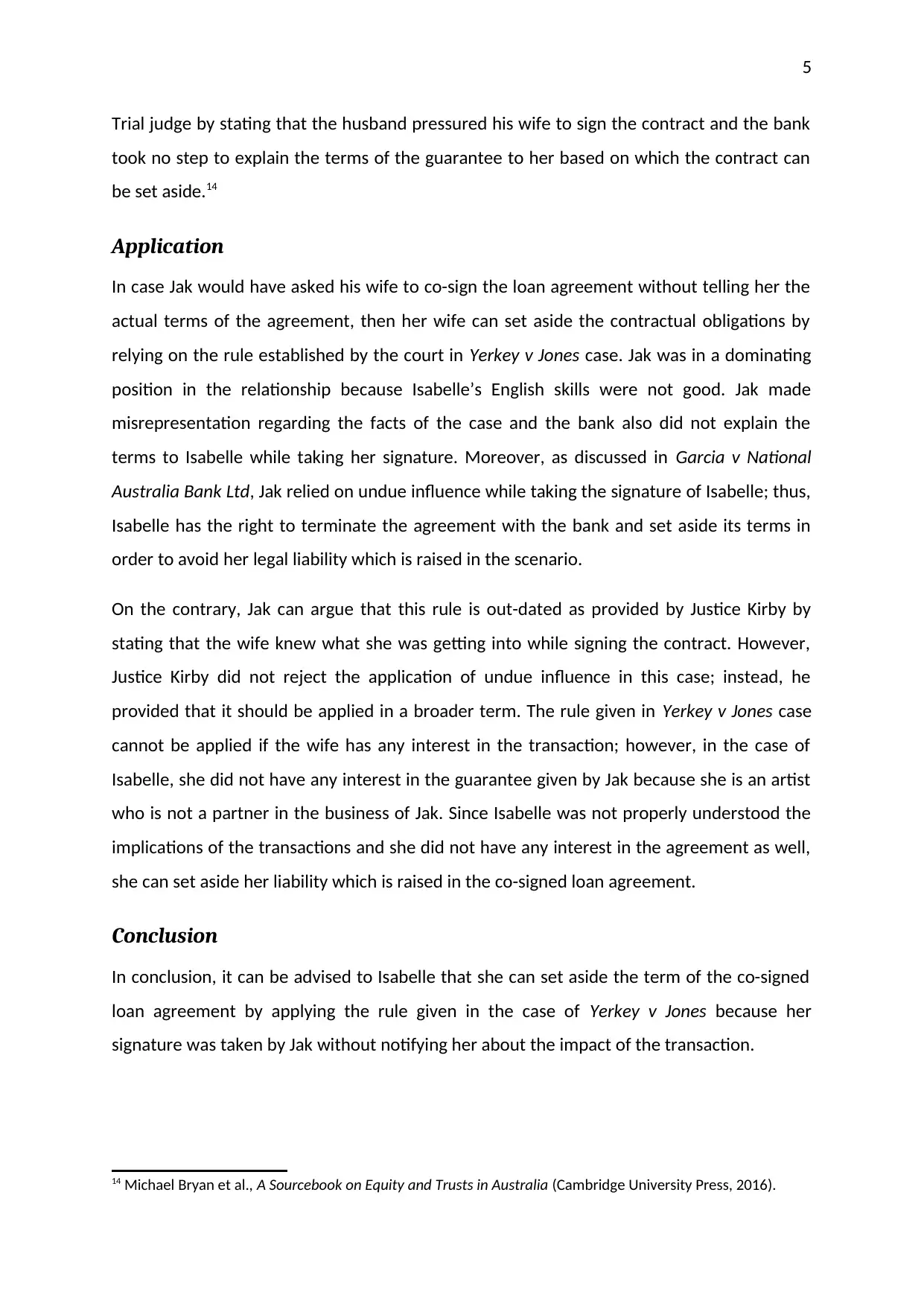
5
Trial judge by stating that the husband pressured his wife to sign the contract and the bank
took no step to explain the terms of the guarantee to her based on which the contract can
be set aside.14
Application
In case Jak would have asked his wife to co-sign the loan agreement without telling her the
actual terms of the agreement, then her wife can set aside the contractual obligations by
relying on the rule established by the court in Yerkey v Jones case. Jak was in a dominating
position in the relationship because Isabelle’s English skills were not good. Jak made
misrepresentation regarding the facts of the case and the bank also did not explain the
terms to Isabelle while taking her signature. Moreover, as discussed in Garcia v National
Australia Bank Ltd, Jak relied on undue influence while taking the signature of Isabelle; thus,
Isabelle has the right to terminate the agreement with the bank and set aside its terms in
order to avoid her legal liability which is raised in the scenario.
On the contrary, Jak can argue that this rule is out-dated as provided by Justice Kirby by
stating that the wife knew what she was getting into while signing the contract. However,
Justice Kirby did not reject the application of undue influence in this case; instead, he
provided that it should be applied in a broader term. The rule given in Yerkey v Jones case
cannot be applied if the wife has any interest in the transaction; however, in the case of
Isabelle, she did not have any interest in the guarantee given by Jak because she is an artist
who is not a partner in the business of Jak. Since Isabelle was not properly understood the
implications of the transactions and she did not have any interest in the agreement as well,
she can set aside her liability which is raised in the co-signed loan agreement.
Conclusion
In conclusion, it can be advised to Isabelle that she can set aside the term of the co-signed
loan agreement by applying the rule given in the case of Yerkey v Jones because her
signature was taken by Jak without notifying her about the impact of the transaction.
14 Michael Bryan et al., A Sourcebook on Equity and Trusts in Australia (Cambridge University Press, 2016).
Trial judge by stating that the husband pressured his wife to sign the contract and the bank
took no step to explain the terms of the guarantee to her based on which the contract can
be set aside.14
Application
In case Jak would have asked his wife to co-sign the loan agreement without telling her the
actual terms of the agreement, then her wife can set aside the contractual obligations by
relying on the rule established by the court in Yerkey v Jones case. Jak was in a dominating
position in the relationship because Isabelle’s English skills were not good. Jak made
misrepresentation regarding the facts of the case and the bank also did not explain the
terms to Isabelle while taking her signature. Moreover, as discussed in Garcia v National
Australia Bank Ltd, Jak relied on undue influence while taking the signature of Isabelle; thus,
Isabelle has the right to terminate the agreement with the bank and set aside its terms in
order to avoid her legal liability which is raised in the scenario.
On the contrary, Jak can argue that this rule is out-dated as provided by Justice Kirby by
stating that the wife knew what she was getting into while signing the contract. However,
Justice Kirby did not reject the application of undue influence in this case; instead, he
provided that it should be applied in a broader term. The rule given in Yerkey v Jones case
cannot be applied if the wife has any interest in the transaction; however, in the case of
Isabelle, she did not have any interest in the guarantee given by Jak because she is an artist
who is not a partner in the business of Jak. Since Isabelle was not properly understood the
implications of the transactions and she did not have any interest in the agreement as well,
she can set aside her liability which is raised in the co-signed loan agreement.
Conclusion
In conclusion, it can be advised to Isabelle that she can set aside the term of the co-signed
loan agreement by applying the rule given in the case of Yerkey v Jones because her
signature was taken by Jak without notifying her about the impact of the transaction.
14 Michael Bryan et al., A Sourcebook on Equity and Trusts in Australia (Cambridge University Press, 2016).
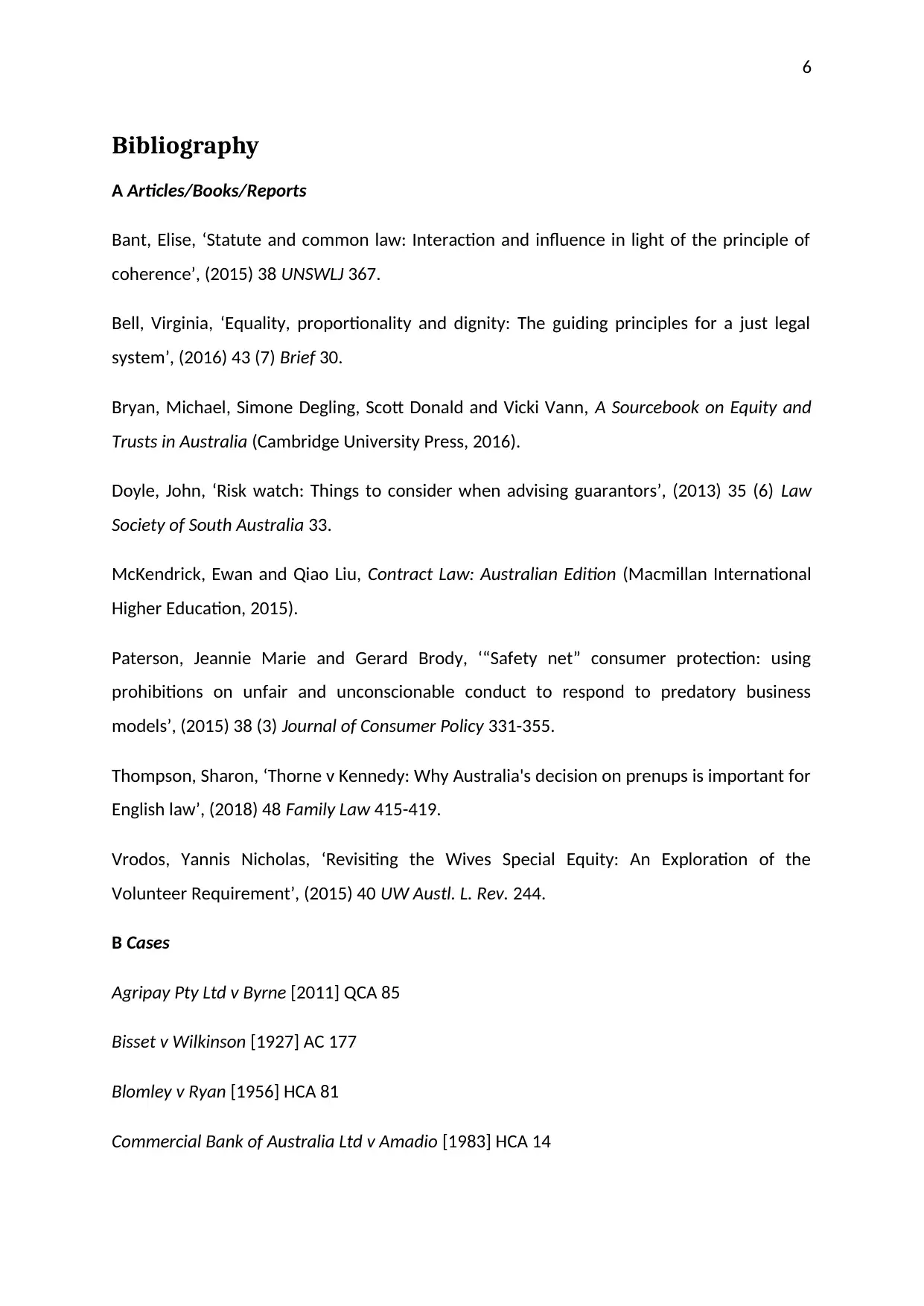
6
Bibliography
A Articles/Books/Reports
Bant, Elise, ‘Statute and common law: Interaction and influence in light of the principle of
coherence’, (2015) 38 UNSWLJ 367.
Bell, Virginia, ‘Equality, proportionality and dignity: The guiding principles for a just legal
system’, (2016) 43 (7) Brief 30.
Bryan, Michael, Simone Degling, Scott Donald and Vicki Vann, A Sourcebook on Equity and
Trusts in Australia (Cambridge University Press, 2016).
Doyle, John, ‘Risk watch: Things to consider when advising guarantors’, (2013) 35 (6) Law
Society of South Australia 33.
McKendrick, Ewan and Qiao Liu, Contract Law: Australian Edition (Macmillan International
Higher Education, 2015).
Paterson, Jeannie Marie and Gerard Brody, ‘“Safety net” consumer protection: using
prohibitions on unfair and unconscionable conduct to respond to predatory business
models’, (2015) 38 (3) Journal of Consumer Policy 331-355.
Thompson, Sharon, ‘Thorne v Kennedy: Why Australia's decision on prenups is important for
English law’, (2018) 48 Family Law 415-419.
Vrodos, Yannis Nicholas, ‘Revisiting the Wives Special Equity: An Exploration of the
Volunteer Requirement’, (2015) 40 UW Austl. L. Rev. 244.
B Cases
Agripay Pty Ltd v Byrne [2011] QCA 85
Bisset v Wilkinson [1927] AC 177
Blomley v Ryan [1956] HCA 81
Commercial Bank of Australia Ltd v Amadio [1983] HCA 14
Bibliography
A Articles/Books/Reports
Bant, Elise, ‘Statute and common law: Interaction and influence in light of the principle of
coherence’, (2015) 38 UNSWLJ 367.
Bell, Virginia, ‘Equality, proportionality and dignity: The guiding principles for a just legal
system’, (2016) 43 (7) Brief 30.
Bryan, Michael, Simone Degling, Scott Donald and Vicki Vann, A Sourcebook on Equity and
Trusts in Australia (Cambridge University Press, 2016).
Doyle, John, ‘Risk watch: Things to consider when advising guarantors’, (2013) 35 (6) Law
Society of South Australia 33.
McKendrick, Ewan and Qiao Liu, Contract Law: Australian Edition (Macmillan International
Higher Education, 2015).
Paterson, Jeannie Marie and Gerard Brody, ‘“Safety net” consumer protection: using
prohibitions on unfair and unconscionable conduct to respond to predatory business
models’, (2015) 38 (3) Journal of Consumer Policy 331-355.
Thompson, Sharon, ‘Thorne v Kennedy: Why Australia's decision on prenups is important for
English law’, (2018) 48 Family Law 415-419.
Vrodos, Yannis Nicholas, ‘Revisiting the Wives Special Equity: An Exploration of the
Volunteer Requirement’, (2015) 40 UW Austl. L. Rev. 244.
B Cases
Agripay Pty Ltd v Byrne [2011] QCA 85
Bisset v Wilkinson [1927] AC 177
Blomley v Ryan [1956] HCA 81
Commercial Bank of Australia Ltd v Amadio [1983] HCA 14
Paraphrase This Document
Need a fresh take? Get an instant paraphrase of this document with our AI Paraphraser

7
Garcia v National Australia Bank Ltd [1998] HCA 48
Yerkey v Jones (1939) 63 CLR 649
Garcia v National Australia Bank Ltd [1998] HCA 48
Yerkey v Jones (1939) 63 CLR 649
1 out of 8
Related Documents
Your All-in-One AI-Powered Toolkit for Academic Success.
+13062052269
info@desklib.com
Available 24*7 on WhatsApp / Email
![[object Object]](/_next/static/media/star-bottom.7253800d.svg)
Unlock your academic potential
© 2024 | Zucol Services PVT LTD | All rights reserved.





